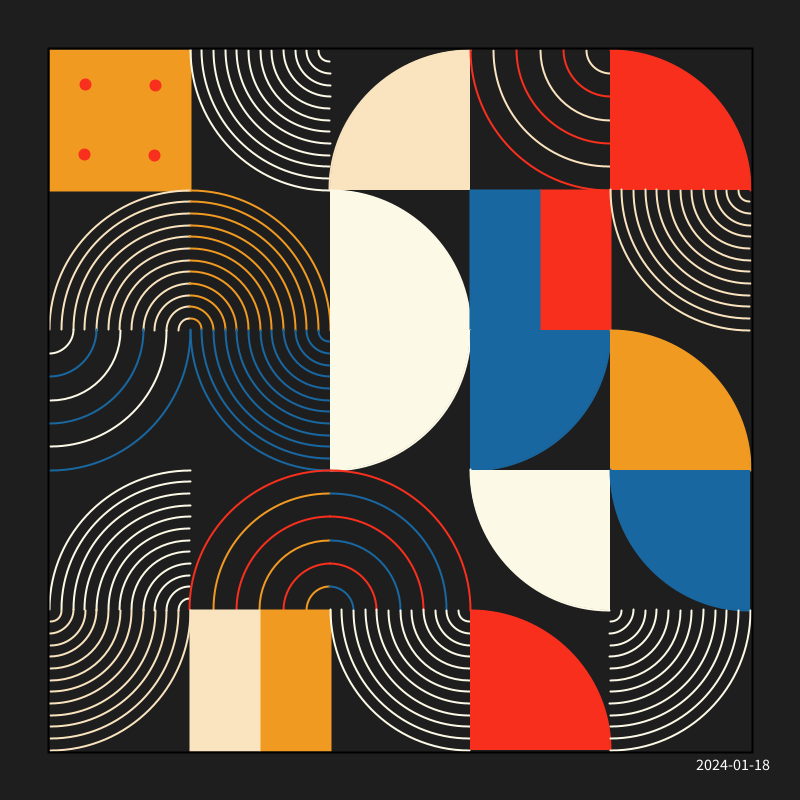"""2024-01-18
Genuary 18 - Bauhaus
Padrão inspirado por Bauhaus, implementado em uma grade de 5 linhas por 5 colunas.
png
Sketch,py5,CreativeCoding,genuary,genuary18
"""
from random import choice
import py5
from numpy.random import choice as np_choice
from utils import helpers
sketch = helpers.info_for_sketch(__file__, __doc__)
MARGEM = 50
LARGURA = 140
FUNDO = (30, 30, 30)
CORES = [
(252, 249, 230),
(241, 154, 34),
(25, 103, 160),
(248, 47, 29),
(250, 228, 191),
]
def cria_grade(
xi: int,
xf: int,
yi: int,
yf: int,
celula_x: int,
celula_y: int,
centralizada: bool = False,
):
"""Cria uma grade."""
pontos = []
celula_x = int(celula_x)
celula_y = int(celula_y)
metade_x = celula_x / 2
metade_y = celula_y / 2
for yb in range(yi, yf, celula_y):
y = yb + (metade_y if centralizada else 0)
for xb in range(xi, xf, celula_x):
x = xb + (metade_x if centralizada else 0)
pontos.append((x, y))
return pontos
def modulo_01(x, y, largura, cor, *args):
x0 = x - largura / 2
y0 = y - largura / 2
py5.fill(cor)
py5.stroke(cor)
py5.arc(x0, y0, 2 * largura, 2 * largura, py5.radians(0), py5.radians(90))
def modulo_02(x, y, largura, cor, *args):
x0 = x - largura / 2
y0 = y - largura / 2
py5.no_fill()
py5.stroke_weight(2)
py5.stroke(cor)
passos = 12
passo = largura * 2 / passos
for i in range(0, passos):
largura_ = passo * i + passo
py5.arc(x0, y0, largura_, largura_, py5.radians(0), py5.radians(90))
def modulo_03(x, y, largura, cor_base, cor_alternativa):
meio = largura / 2
x0 = x - meio
y0 = y - meio
py5.no_fill()
py5.stroke_weight(2)
passos = 6
passo = largura * 2 / passos
for i in range(passos):
cor = cor_base if i % 2 else cor_alternativa
largura_ = passo * i + passo
py5.stroke(cor)
py5.arc(x0, y0, largura_, largura_, py5.radians(0), py5.radians(90))
def modulo_04(x, y, largura, cor_base, cor_alternativa):
meio = largura / 2
y0 = y - meio
y1 = y + meio
py5.rect_mode(py5.CORNERS)
for x0, x1, cor in ([x - meio, x, cor_base], [x + 1, x + meio, cor_alternativa]):
py5.fill(cor)
py5.stroke(cor)
py5.rect(x0, y0, x1, y1)
def modulo_05(x, y, largura, cor_base, cor_alternativa):
meio = largura / 2
quarto = meio / 2
x0 = x - meio
x1 = x + meio
y0 = y - meio
y1 = y + meio
py5.rect_mode(py5.CORNERS)
py5.stroke(cor_base)
py5.fill(cor_base)
py5.rect(x0, y0, x1, y1)
coordenadas = [
(x0 + quarto, y0 + quarto),
(x1 - quarto, y0 + quarto),
(x0 + quarto, y1 - quarto),
(x1 - quarto, y1 - quarto),
]
for x, y in coordenadas:
py5.stroke(cor_alternativa)
py5.fill(cor_alternativa)
py5.circle(x, y, 10)
MODULOS = [modulo_01, modulo_02, modulo_03, modulo_04, modulo_05]
PROBABILIDADES = [0.4, 0.3, 0.15, 0.05, 0.1]
def borda(xi, xf, yi, yf):
with py5.push_style():
py5.rect_mode(py5.CORNERS)
py5.stroke(0)
py5.stroke_weight(2)
py5.no_fill()
py5.rect(xi - 2, yi - 2, xf + 2, yf + 2)
def setup():
py5.size(helpers.LARGURA, helpers.ALTURA)
py5.frame_rate(1)
def draw():
py5.background(py5.color(*FUNDO))
xi = MARGEM
xf = py5.width - MARGEM
yi = MARGEM
yf = py5.height - MARGEM
pontos = cria_grade(xi, xf, yi, yf, LARGURA, LARGURA, True)
modulos = [modulo_01, modulo_02, modulo_03, modulo_04, modulo_05]
for x, y in pontos:
modulo = np_choice(modulos, 1, p=PROBABILIDADES)[0]
cor_base = py5.color(*choice(CORES))
cor_alternativa = py5.color(*choice(CORES))
if cor_alternativa == cor_base:
cor_alternativa = py5.color(*choice(CORES))
rotacao = choice([0, 90, 180, 270])
with py5.push_matrix():
py5.translate(x, y)
py5.rotate(py5.radians(rotacao))
modulo(0, 0, LARGURA, cor_base, cor_alternativa)
borda(xi, xf, yi, yf)
helpers.write_legend(sketch=sketch)
py5.no_loop()
def key_pressed():
key = py5.key
if key == " ":
save_and_close()
elif key == "r":
py5.redraw()
def save_and_close():
py5.no_loop()
helpers.save_sketch_image(sketch)
py5.exit_sketch()
if __name__ == "__main__":
py5.run_sketch()
